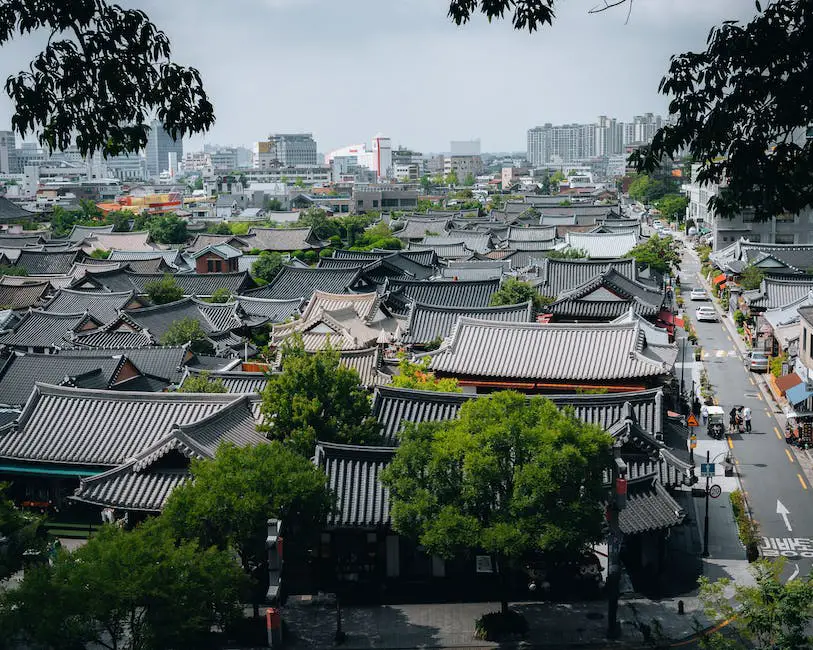
Jeonju, a city brimming with tradition, culture, and mouthwatering cuisine, is a hidden gem in South Korea’s crown. It’s a place where the past and present coexist, offering a feast for the senses and a treasure trove of experiences. From the moment I set foot in this city, I knew it was a special place. The vibrant colors of the Hanok Village, the tantalizing aromas from the street food vendors, and the serene whispers of history echoing through ancient temples; Jeonju is a city that stays with you long after you leave.
One of the city’s most iconic spots is the Jeonju Hanok Village. It’s like stepping back in time as you wander through over 800 traditional Korean houses, known as hanoks. The tiled roofs and wooden beams tell stories of yesteryear, while the modern touches inside some of these homes show how well the city marries its rich history with contemporary living. It’s a must-visit, and trust me, you’ll want to have your camera ready for the countless photo ops.
But Jeonju isn’t just about looking back; it’s also about embracing the now. The Jaman Mural Village, a stone’s throw away from the Hanok Village, is a testament to that. Here, the walls serve as canvases for local artists, showcasing vibrant murals that bring the narrow alleys to life. It’s a place where art and community meet, and every corner turned is a new surprise.
For those who appreciate the tranquility of nature, the Jeonju Zoo and Deokjin Park offer a green escape. The park, with its large pond and seasonal lotus flowers, is perfect for a leisurely stroll or a picnic. And let’s not forget the zoo, where families can spend a fun-filled day meeting animals from around the world.
Foodies, get ready to indulge in Jeonju’s culinary delights. The city is famous for its version of bibimbap, a Korean dish that’s as delicious as it is beautiful. The Nambu Market, with its bustling energy and endless food stalls, is the place to try this and other local specialties. And if you’re up for a little tipple, the Moju Experience Hall is where you can learn about (and taste!) moju, a traditional Korean liquor.
For a dose of spirituality or just a moment of peace, the Gyeonggijeon Shrine is a sanctuary. It houses the portrait of King Taejo, the founder of the Joseon Dynasty, and the serene atmosphere is palpable. The shrine’s grounds are also home to ancient trees and traditional buildings, making it a picturesque spot for reflection.
No visit to Jeonju would be complete without experiencing the Hanji Culture Festival if you’re lucky enough to be in town at the right time. Hanji is traditional Korean paper, and this festival celebrates it in all its glory. From workshops to art installations, it’s a unique way to engage with Korean culture.
For a touch of modernity, the Jeonju Digital Independent Film Festival showcases the city’s creative future. It’s a hub for film enthusiasts and a platform for indie filmmakers to shine. Meanwhile, the Jeonju National Museum delves into the region’s history, offering a comprehensive look at its cultural heritage.
As night falls, the Pungnammun Gate stands tall, illuminated and majestic. It’s the last remaining gate of the original castle town and a symbol of Jeonju’s endurance. Nearby, the night markets come alive, offering everything from vintage clothes to handmade crafts.
Lastly, for those seeking adventure, the Maisan Mountain is a short trip away. Its unique peaks are a natural marvel, and the Tapsa Temple at its base, with its stone pagodas, is a sight to behold.
Now, let’s dive into some FAQs:
**FAQs**
**Q: What’s the best time of year to visit Jeonju?**
A: Spring (April to June) and fall (September to November) are ideal. The weather is pleasant, and you’ll catch the city in full bloom or with autumn leaves.
**Q: Is Jeonju suitable for travelers who don’t speak Korean?**
A: Absolutely! While knowing some basic Korean phrases can enhance your experience, many locals are accustomed to tourists and can communicate in English.
**Q: Are there any accommodations within the Hanok Village?**
A: Yes, there are several hanok stays where you can experience traditional Korean living with modern comforts.
**Conclusion**
Jeonju is a city that captures the heart with its blend of history, culture, and modernity. From the quaint streets of the Hanok Village to the artistic alleys of Jaman Mural Village, there’s a story waiting to be discovered around every corner. Whether you’re savoring the flavors of the local cuisine, soaking in the tranquility of Gyeonggijeon Shrine, or exploring the natural wonders at Maisan Mountain, Jeonju offers an array of experiences that cater to every traveler. It’s a city that doesn’t just show you its treasures; it invites you to live them. So pack your bags, bring your curiosity, and get ready to fall in love with one of South Korea’s most enchanting destinations. Jeonju awaits, ready to etch its memories in your travel diary.